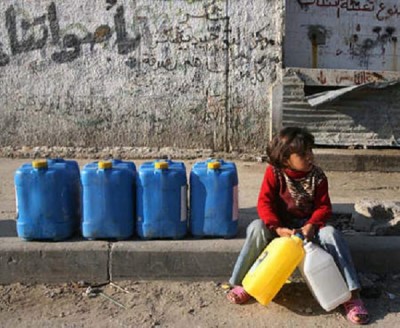UK Sanctions Enforcer Targets Aid Charities Working in Gaza
Charities told they must provide details of all payments in territory since Hamas was added to UK sanctions list in 2020

All Global Research articles can be read in 51 languages by activating the Translate Website button below the author’s name.
To receive Global Research’s Daily Newsletter (selected articles), click here.
Click the share button above to email/forward this article to your friends and colleagues. Follow us on Instagram and Twitter and subscribe to our Telegram Channel. Feel free to repost and share widely Global Research articles.
***
British aid charities working in Gaza have been told they must provide details about their operations and finances in the Hamas-controlled Palestinian territory to the UK government’s office responsible for enforcing financial sanctions.
In a letter sent earlier this month, the Treasury’s Office of Financial Sanctions Implementation (OFSI) asked charities for information including payments to local authorities and for utilities and services purchased in Gaza since December 2020 when Hamas was added to a UK counter-terrorism sanctions list.
The letter is described as a “formal request” for information required by OFSI to monitor compliance with sanctions regulations.
It says the charities have been contacted because they are registered on the Charity Commission’s public register as operating in the Occupied Palestinian Territories.
“As a charity with operations in the Occupied Palestinian Territories, potentially in Gaza, it is your responsibility to ensure you are compliant with financial sanctions obligations,” it says.
Middle East Eye is aware of at least nine charities that have received copies of the letter in the past week. They include a number of Muslim charities as well as members of the Disasters Emergency Committee, a coalition of 15 leading aid charities.
The letter asks the charities to confirm if they operate in Gaza and to provide “details of any payments such as local authority charges, taxes, utilities, and services including water supply, waste services [and] telephone or broadband payments”.
It states that charities must provide details including exact dates and amounts paid, the names of recipient organisations or persons, a summary of why the payment was made, and supporting documents such as invoices and receipts.
It warns that failure to do so may be considered an offence under counter-terrorism sanctions regulations and says that a response must be sent by 28 April.
Letter sent at start of Ramadan
Sources at some charities which received the letter said they were consulting their lawyers. Others expressed annoyance that the letter had been sent out at the beginning of Ramadan.
“They have contacted Muslim charities in the first two days of Ramadan with a response deadline of one month. This is absurd. They know this,” said one charity official, speaking on condition of anonymity.
A source working for a major charity said OFSI’s request was “a big ask for any finance department in quite a short space of time, especially over Easter and Ramadan”.
Tom Keatinge, director of the Centre for Financial Crime and Security Studies at the Royal United Services Institute, told MEE that the letter raised questions about why OFSI was seeking the information requested, and how its disclosure would support compliance.
“I am wondering if someone in OFSI has recently woken up to the fact that, given the control Hamas has of Gaza, there is likely to be some sort of financial connection between the provision of utilities and municipal services and Hamas – with the associated implications,” Keatinge told MEE.
“The fact that the letter includes the threat of an offence seems unnecessarily heavy-handed.”
More than 500 British charities are listed as working in the Occupied Palestinian Territories on the Charity Commission register.
But far fewer work in Gaza because of the challenges of operating in the territory ever since it was blockaded by Israel in 2007 in response to Hamas gaining control.
About 1.3 million people, or 58 percent of the population of Gaza, require humanitarian assistance according to the United Nations Office for the Coordination of Humanitarian Affairs (OCHA).
A report on the Muslim humanitarian charity sector in the UK published by the Ayaan Institute think tank last month estimated there were 61 projects in Gaza run by British-based Muslim charities between 2017 and 2021.
The Treasury’s counter-terrorism sanctions against Hamas predate the movement’s proscription as a terrorist group by the Home Office.
Hamas’s military wing, the Izz al-Din al-Qassam Brigades, has been proscribed in the UK since 2001.
But in November 2021, the British government added Hamas’ political wing to its list of banned organisations, raising concerns that charities working in Gaza could be at risk of breaching terrorism laws.
Some charities have also faced problems sending funds to partners on the ground because banks consider money transfers to Gaza to be a high-risk activity.
Nur Choudhury, the chairman of Human Aid, a Muslim charity based in east London, told MEE it had become much more difficult for British charities to work in Gaza, and said that Muslim charities would be particularly hard-pressed to respond to the letter.
“Muslim charities are generally much smaller in size and more agile and this will take away valuable resources that are limited anyway,” said Choudhury.
“You are hitting Muslim charities at the busiest time of the year. This is grossly unfair.”
A Treasury spokesperson declined to comment and referred MEE to financial sanctions guidance for charities published by OFSI.
The Charity Commission also declined to comment and referred MEE to its own guidance for charities operating in areas where financial sanctions are in force.
*
Note to readers: Please click the share button above. Follow us on Instagram and Twitter and subscribe to our Telegram Channel. Feel free to repost and share widely Global Research articles.

